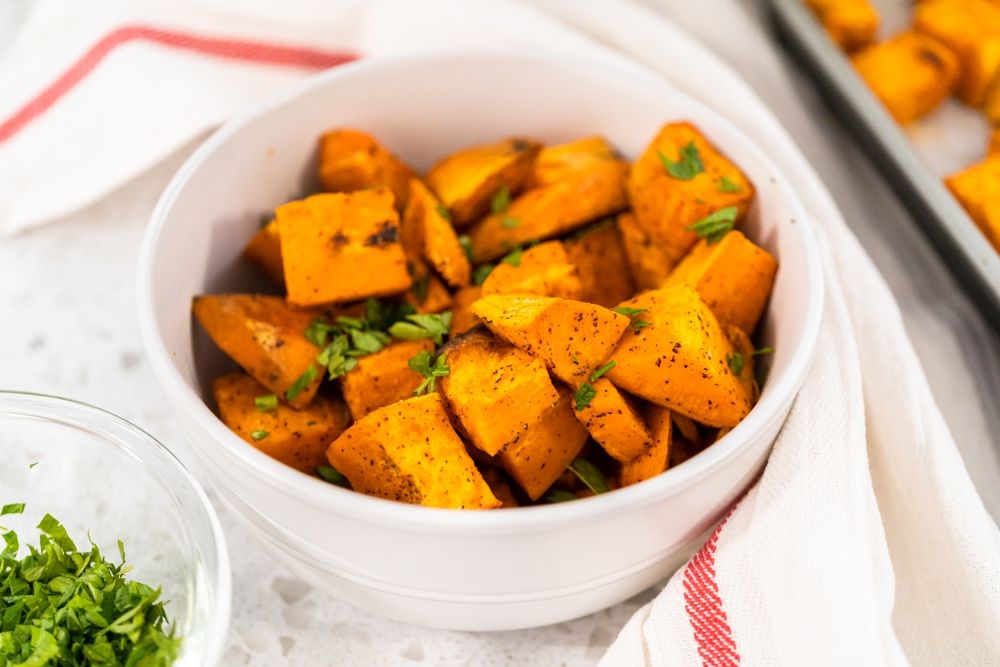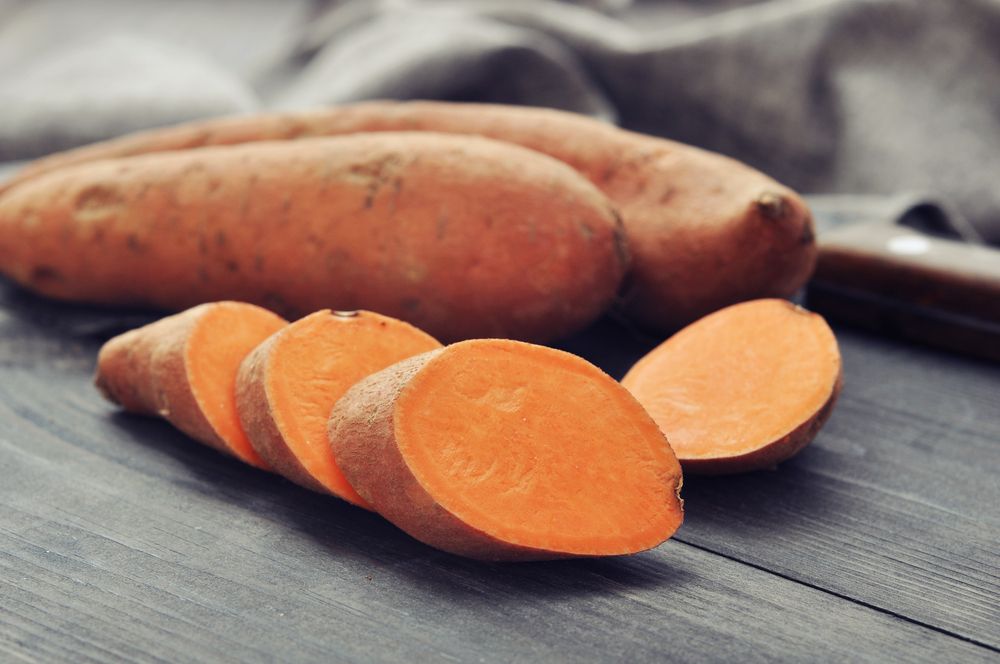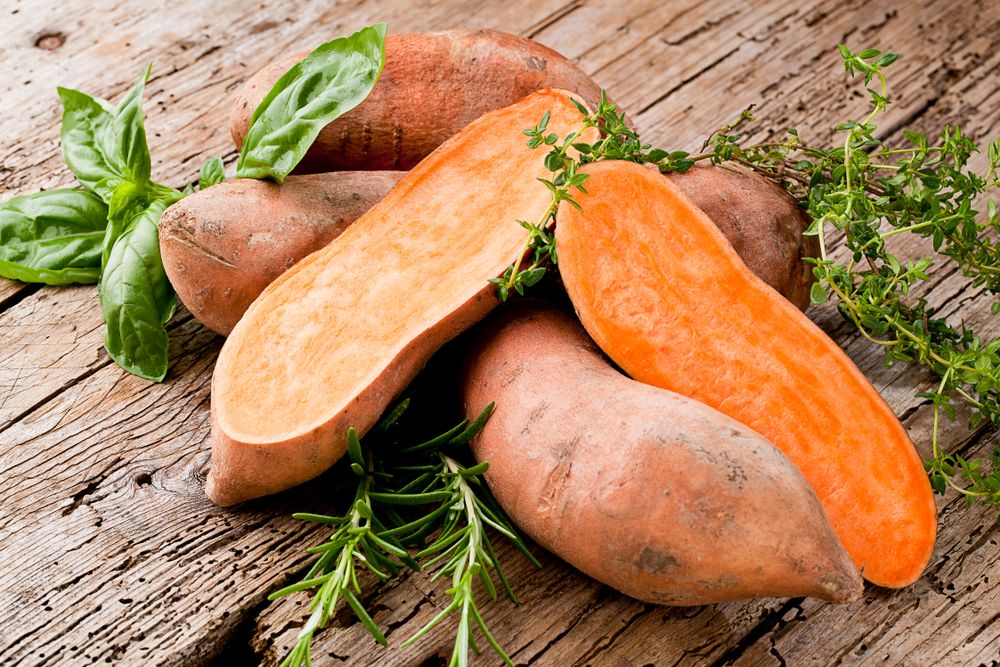
Sweet potatoes, a favorite in the world of healthy carbs, are highly regarded by dietitians for their exceptional nutritional value. Packed with essential nutrients such as fiber, vitamin A, and potassium, they contribute to overall health—provided they aren't frequently paired with sugary toppings like melted marshmallows.
While sweet potatoes offer numerous health benefits, there are certain groups of people who should limit their intake. In this article, we'll dive into both the advantages and potential drawbacks of sweet potatoes and discuss how to incorporate them into a balanced diet. Keep reading, and for further insights, don't miss our take on whether white or sweet potatoes are the healthier option.
Sweet Potato Nutrition

Nutrition (Per 1 cup, cooked):
Calories: 180
Fat: 0 g (Saturated fat: 0 g)
Sodium: 72 mg
Carbs: 41 g (Fiber: 7 g, Sugar: 13 g)
Protein: 4 g
The Benefits of Sweet Potatoes

They're Excellent for Heart Health
Sweet potatoes are rich in fiber and potassium, two nutrients essential for heart health. Just one cup of baked sweet potatoes provides about 24% of your daily fiber needs and 20% of your daily potassium intake.
Fiber plays a key role in heart health by preventing fats from being absorbed into the bloodstream, which helps lower LDL, or "bad" cholesterol, according to Harvard Health Publishing. Potassium, on the other hand, helps reduce blood pressure by relaxing blood vessel walls, allowing blood to flow more easily. Keeping cholesterol and blood pressure in check is crucial for reducing the risk of heart disease, the leading cause of death in the U.S.
They Protect Your Vision
Carrots are often touted as the go-to vegetable for eye health, but sweet potatoes are just as beneficial, thanks to their high beta-carotene content—the same pigment that gives them their vibrant color. One cup of cooked sweet potato provides 213% of the daily value of beta-carotene, which is essential for maintaining good vision.
Beta-carotene is an antioxidant that helps prevent the progression of eye diseases by neutralizing free radicals that can damage the retina, according to a 2020 study in Antioxidants. The liver converts some beta-carotene into vitamin A, a nutrient necessary for normal vision, as noted by the National Institutes of Health.
To enhance the absorption of beta-carotene, pair your sweet potato with a small amount of healthy fat, such as grass-fed butter, extra-virgin olive oil, or avocado. Fat helps the body better convert beta-carotene into vitamin A.
They Can Help Manage Blood Sugar
Sweet potatoes contain a variety of plant compounds that can help regulate blood sugar levels.
For starters, they are high in fiber, with 4 grams per 1 cup of cubed sweet potatoes. "Fiber slows down digestion, leading to a steady release of sugar into the bloodstream, which helps prevent high blood sugar spikes," explains Sarah Alsing, MS, RD, a registered dietitian and owner of Delightfully Fueled.
In addition, sweet potatoes contain compounds called flavonoids and polyphenols. According to a 2021 study in the International Journal of Molecular Sciences, these compounds may promote glucose absorption and improve insulin secretion, helping to maintain healthy blood sugar levels.
Foods with a low glycemic index (GI) are less likely to cause significant blood sugar spikes. Sweet potatoes can have a low GI depending on how they are prepared. Boiling sweet potatoes results in a low to medium GI, and the longer they are boiled, the lower the GI, according to a 2011 study in the Journal of Nutrition and Metabolism. In contrast, roasted, baked, and fried sweet potatoes tend to have a higher GI.
They Can Boost Immunity
As the winter months approach, consider adding more sweet potatoes to your diet.
One baked sweet potato contains 156% of the daily value of vitamin A, a nutrient crucial for a healthy immune system. "Vitamin A enhances your body's immune response and is being studied for its potential use in treating infectious diseases," says Alsing.
The National Library of Medicine notes that a deficiency in vitamin A can lead to a weakened immune system and a higher risk of infections. Regularly consuming sweet potatoes can help you meet your vitamin A needs and support a robust immune system.
They Support Gut Health
Fiber is vital for maintaining a healthy gut, and sweet potatoes are a tasty way to boost your intake.
Our gastrointestinal tract doesn’t digest fiber; instead, it passes through and ferments in the colon. This fermentation process produces healthy bacteria (probiotics) and other beneficial compounds, such as short-chain fatty acids (SCFA), according to a 2022 study in Microorganisms. Probiotics and SCFA help promote a diverse and healthy gut microbiome by strengthening the intestinal barrier.
Increasing your fiber intake can also promote regular bowel movements. If you struggle with constipation, try incorporating more fiber-rich foods like sweet potatoes into your diet.
They Are Versatile and Fit Into Many Diets
Sweet potatoes are a nutritious carbohydrate source that can be easily incorporated into various eating plans, including Mediterranean, gluten-free, and plant-based diets. "Sweet potatoes are one of my favorite carb sources because they are versatile and high in fiber," says Alsing.
You can’t go wrong with classic roasted sweet potatoes tossed in olive oil and garlic powder. When you’re in the mood for something sweet, Alsing suggests roasting them with cinnamon and cayenne pepper.
For a quick and easy meal, Alsing recommends using your microwave. "When I need a fast meal, I make a baked sweet potato in the microwave—it takes about five minutes. Then, I stuff it with ground turkey, black beans, salsa, and avocado," she says. (Try her recipe for Quick Turkey Stuffed Sweet Potatoes.)
Potential Side Effects of Eating Too Many Sweet Potatoes

They Might Turn Your Skin Orange
As unusual as it may sound, consuming too much beta-carotene from foods like sweet potatoes and carrots can give your skin an orange tint. This condition, known as carotenodermia, is harmless and relatively rare. You would need to eat a large amount of sweet potatoes consistently over a long period to develop this Oompa-Loompa-like hue.
"You'd have to eat about 3 cups of cubed sweet potatoes or one and a half medium-sized sweet potatoes every day for several months to experience carotenodermia," explains Alsing.
They're High in Oxalates
People prone to calcium oxalate kidney stones, the most common type of kidney stone, should be cautious with large portions of sweet potatoes.
Sweet potatoes are high in oxalates, containing 54 milligrams per 1/2 cup serving. Those who need to follow a low-oxalate diet, such as individuals with kidney stones, should limit their oxalate intake to 50-100 milligrams per day, advises Alsing.
However, if you're not at increased risk for kidney stones, you can—and should—enjoy oxalate-rich foods like sweet potatoes because of their nutritional benefits.
To reduce the risk of calcium oxalate stones, it's important to stay well-hydrated and consume sufficient calcium, which can be obtained from dairy products. "Drinking enough fluids is the best way to prevent kidney stones because it dilutes your urine, preventing the buildup of chemicals that form stones," Alsing says. "Getting enough calcium is also crucial because it binds with oxalates in the digestive system, helping to excrete them through the bowels rather than allowing them to reach the kidneys."

